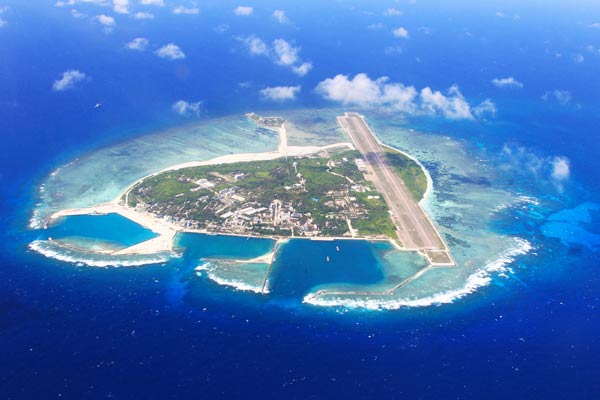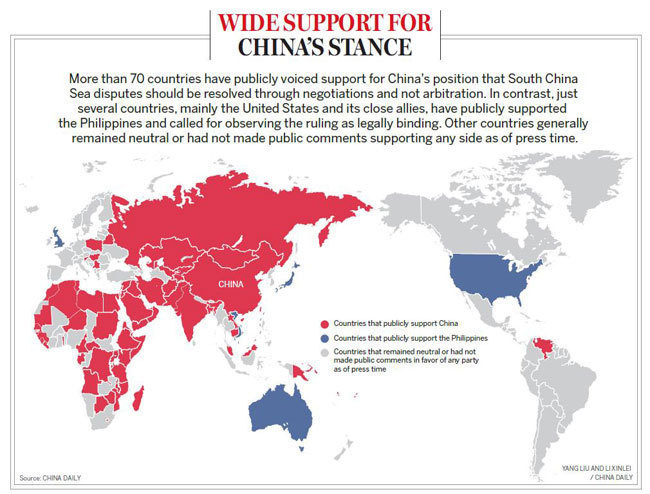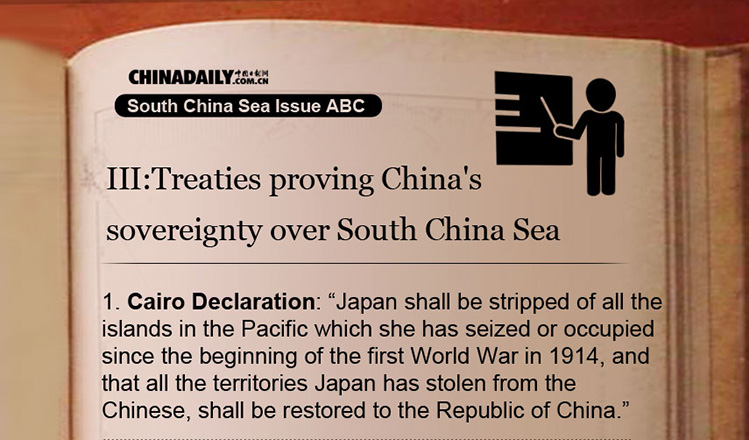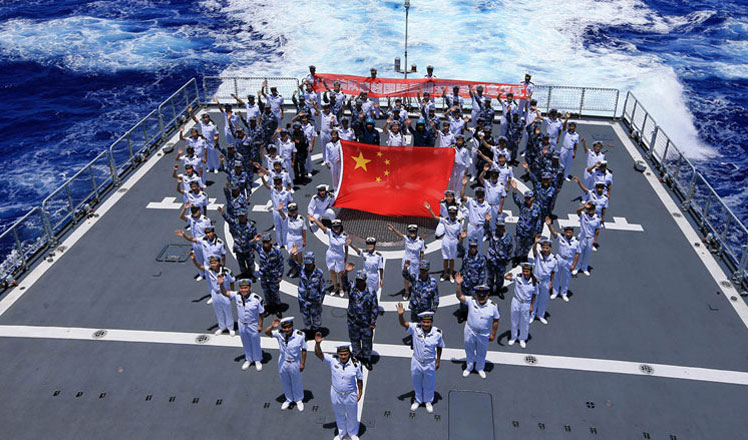Ruling 'null and void', with no binding force
Updated: 2016-07-13 03:19
By Fu Jing, An Baijie(China Daily)
|
||||||||
Nation remains committed to resolving maritime disputes through negotiation, President Xi says
 |
|
Yongxing Island is home to the government of Sansha, China's southernmost city. [Photo/Xinhua] |
China is committed to resolving disputes through direct negotiations, but its national sovereignty and maritime interests will not be influenced under any circumstances by the South China Sea ruling by the Arbitral Tribunal of The Hague, President Xi Jinping said on Tuesday.
The South China Sea Islands have been China's territory since ancient times, and China refuses to accept any claims or activities based on the arbitral ruling, Xi said while meeting in Beijing with European Council President Donald Tusk and European Commission President Jean-Claude Juncker.
The Arbitral Tribunal, appointed by the Permanent Court of Arbitration in The Hague, announced on Tuesday that China has no "historic title" over the South China Sea.
The Foreign Ministry said in a statement that the ruling "is null and void and has no binding force".
China has always respected international laws and justice and kept to a path of peaceful development, Xi said. Maritime disputes should be resolved though direct negotiations on the basis of respecting historical facts and in line with international laws, he added.
Premier Li Keqiang, while meeting with Tusk and Juncker, called on Europeans to insist on justice and remain neutral on the issue.
Beijing issued two statements immediately after the arbitration ruling was announced. Noting that Chinese activities in the South China Sea date back more than 2,000 years, one statement pointed out that China is the first to have discovered, named, explored and exploited the South China Sea Islands and surrounding waters.
Manila said it welcomed the ruling, but it urged "restraint and sobriety" by all parties involved.
Meanwhile, Taiwan said on Tuesday that it does not accept the tribunal's ruling. The decision on Taiping Island of the Nansha Islands has "seriously impaired" its rights, according to a news release from the office of Taiwan leader Tsai Ing-wen.
Taiwan reiterated that the disputes should be resolved through negotiations.
Ma Xiaoguang, the mainland's Taiwan affairs spokesman, said on Tuesday night that those on both sides of the Taiwan Straits share responsibility for safeguarding China's sovereignty and maritime rights in the South China Sea.
Foreign Minister Wang Yi warned on Tuesday that the arbitral ruling has placed the South China Sea "in a dangerous situation of intensifying tension and confrontation".

The unilaterally initiated arbitration case is a "sheer political farce in the disguise of law", through which the Philippines aimed to harm China's sovereignty and maritime interests, Wang said.
"The attempts of any power to harm or deny China's sovereignty and maritime interests in any form will be futile," he said.
Wang said that "the temporarily set" Arbitral Tribunal was filled with controversies and injustice and did not represent international law or global justice.
According to Foreign Ministry statistics, more than 70 countries have expressed support for China's stance that negotiation, and not arbitration, is the only way to resolve South China Sea disputes.
Wang said China has noticed that the new government of the Philippines has expressed a willingness to restart negotiations and dialogue on the maritime disputes. China is glad to see the sincerity of the Philippines' new government in trying to improve bilateral ties through real actions, he added.
In 2002, China and the member states of the Association of Southeast Asian Nations signed the Declaration on the Conduct of Parties in the South China Sea, which stipulates that parties should resolve disputes through dialogue and negotiation.
Yang Yujun, spokesman for China's Defense Ministry, noted on Tuesday that China just concluded a large-scale military drill in the South China Sea. Yang said that regardless of the arbitration ruling, China's military will firmly safeguard national sovereignty, security and maritime interests, maintain regional peace and stability, and cope with any threats or challenges.
Zhao Xiaozhuo, a researcher of China-US defense studies at the Academy of Military Science, said that China should firmly stop warships from the US and its allies from trespassing on China's maritime territory.
Meanwhile, China should also enhance crisis management and keep the situation from going out of control, he added.
Wang Wen, executive dean of the think tank Chongyang Institute for Financial Studies at Renmin University of China, said that safeguarding sovereignty does not mean using force, because peace, stability and development are the "main themes" of the South China Sea.
Contact the writers at anbaijie@chinadaily.com.cn
- The South China Sea Arbitration: Illegal, Illegitimate and Invalid
- Theresa May set to be UK's next Prime Minister after rival stands down
- Killing of UN Chinese peacekeepers slamed
- UK's Cameron hums merry tune after announcing PM handover moves
- Manhattanhenge seen in New York
- Philippine, Japan coast guards to hold exercise off Manila Bay

 Tim Duncan announces retirement after 19 seasons with Spurs
Tim Duncan announces retirement after 19 seasons with Spurs
 Merchandize for Rio 2016 a hit in run-up to games
Merchandize for Rio 2016 a hit in run-up to games
 Top 10 best Chinese cities to own a house
Top 10 best Chinese cities to own a house
 Getting to know South China Sea Issue
Getting to know South China Sea Issue
 Ronaldo-less Portugal wins Euro 2016 title
Ronaldo-less Portugal wins Euro 2016 title
 Chinese navy fleet joins RIMPAC 2016 open day
Chinese navy fleet joins RIMPAC 2016 open day
 Staying cool at the zoo amid Shanghai heat wave
Staying cool at the zoo amid Shanghai heat wave
 Tibet through the lens of China Daily reporter
Tibet through the lens of China Daily reporter
Most Viewed
Editor's Picks

|

|

|

|

|

|
Today's Top News
Ministry slams US-Korean THAAD deployment
Two police officers shot at protest in Dallas
Abe's blame game reveals his policies failing to get results
Ending wildlife trafficking must be policy priority in Asia
Effects of supply-side reform take time to be seen
Chinese State Councilor Yang Jiechi to meet Kerry
Chinese stocks surge on back of MSCI rumors
Liang avoids jail in shooting death
US Weekly

|

|









